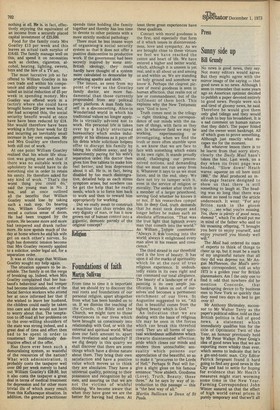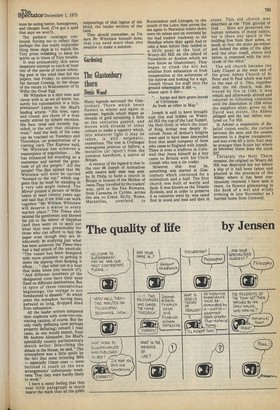Press
Sunny side up
Bill Grundy
No news is good news, they say. Not many editors would agree. But they might agree with the mirror image of the saying — that good news is no news. Although I seem to remember that some years ago an American optimist decided to publish a paper devoted entirely to good news. People were sick and tired of gloomy news, he said. Therefore he would give them only glad tidings and they would all rush to buy his broadsheet. it is a sad comment on human nature that they didn't. The paper folded and the owner went bankrupt. All of which goes to prove something. Although just exactly what escapes me for the moment.
But whatever lesson there is to be learnt from that sorry story, clearly the Daily Mail hasn't taken the hint. Last week, on a day when its front page was headed, "Slow down! Heath warns: squeeze on oil here until 1980," the Mail produced an inside-page feature designed to show us that there is still something to laugh at. The heading was so long that there was almost no need to read the article underneath. It went: "For any Briton sunk in the g400m trap ....see what you're missing. Yes, there is plenty of good news, dammit", which I'm afraid put me in mind of the father who said to his moaning offspring, "I brought you here to enjoy yourself, and enjoy yourself you bloody well The Mail had ordered its team of experts to think of things to cheer u,s up, but it must be a mark of my ungrateful nature that all they did was depress me. Mr Angus McPherson, the Mail's aerospace correspondent, told us why 1973 is a golden year for British planemakers. Am I the only one to, find it odd that nowhere did he mention Concorde, that bankrupting device to fly business men to New York so quickly that they need two days in bed to get over it?
Mr Anthony Shrimsley, successor to Mr Walter Terry as the paper's political editor, told us that British politics is full of good news, a statement which immediately qualifies him for the title of Optimistic Twit of the Year, an honour previously held by Mr Peter Walker. Peter Greig's idea of good news Was that we are exporting more whisky than ever, which seems to indicate that he's a gin-and-tonic man. City Editor Patrick Sergeant found it hard going to find any good news in the City and had to settle for hoping for evidence that Mr Heath's measures might start worming some time in the New Year. Farming Correspondent John Winter assured us that the effect of high world cereal prices is purely temporary and that we'll all
soon be eating better, homegrown, and cheaper food. (I've got a quid that says we won't).
The pathetic catalogue continued, forcing me to reflect that perhaps the one really enjoyable thing these days is to watch the Tory press whistling to keep its spirits up in times of Tory trouble.
It was presumably this same' desperate attempt to catch at least one of the pieces of straw whizz ing past in the wind that led the papers, last Friday, to announce the Second Coming, in the shape of the return to Westminster of St Willie the Good Egg.
Mr Whitelaw is a nice man and clever with it, as we all know, but
surely his canonisation is a little premature? Listen to the Mail's leading article: "His eyes, open
and round, are those of a man easily stirred by simple emotion.
His face, tired and amiably lop sided, is the sort that children trust.” And the hem of his robe can be touched on Tuesdays and
Thursdays, on presentation of a visiting card. The Express said,
"Mr Whitelaw has achieved a masterpiece of negotiation .... He has enhanced his standing as a statesman and earned the grati
tude of all the people." All the people? The Sun opined that Mr
Whitelaw will soon be carried "forward to the top," which suggests that he must be standing at a very odd angle indeed. The
Mirror printed a picture of Willie taken at least twenty years ago
and said that if the Irish can work
together "Mr William Whitelaw will deserve a statue in every market place." The Times also
saluted the gentleman, and likened his job to the labour of Sisyphus (and then went on to spell out what that was, presumably for those who can afford to buy the paper even though they are ill
educated). In studying just what has been achieved, the Times then
had a bad attack of the nauticals.
"The vessel has been designed with more attention to getting It down the slipway than keeping it afloat ... " (but what use is a boat that sinks when you launch it?). "And different members of the
designated crew have their eyes fixed on different destinations. But
in spite of these inauspicious beginnings, the voyage is not foredoomed to disaster." At which
point the metaphor, having been pursued so long, dropped dead from exhaustion.
All the leader writers tempered their euphoria with none-too-con
vincing caution, of course. But the only really deflating (and perhaps properly deflating) remark I read came, as one would expect, from
Mr Andrew Alexander, the Mail's splendidly caustic parliamentary
sketch writer. Describing the debate in the House, he said, "The atmosphere was a little spoilt by the fact that some irritating MPs — especially Ulster ones — were inclined to touch on the new arrangements' unfortunate weakness: That they were hardly likely to work."
I have a nasty feeling that that neat little paragraph is much nearer the mark than all the giddy outpourings of that legion of the blind, the leader writers of the land.
They should remember, as I'm sure Mr Whitelaw himself does, that you need more than one swallow to make a summer.











































 Previous page
Previous page